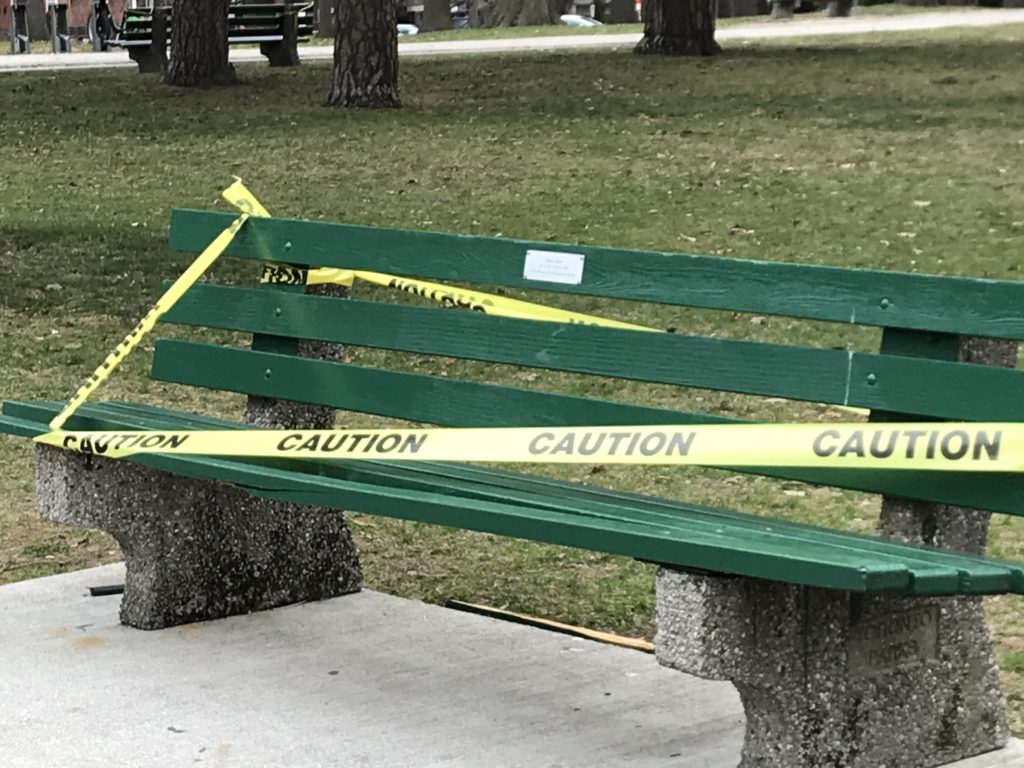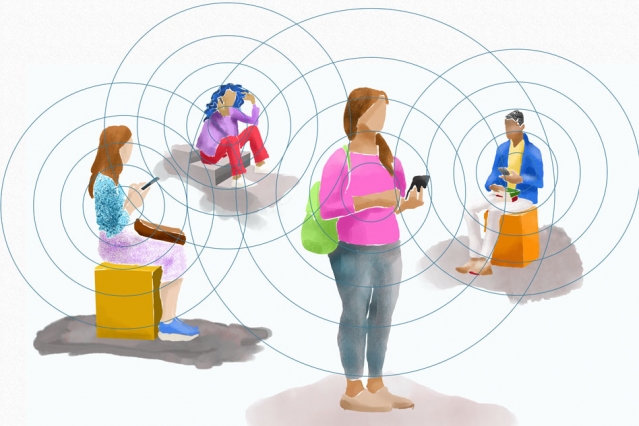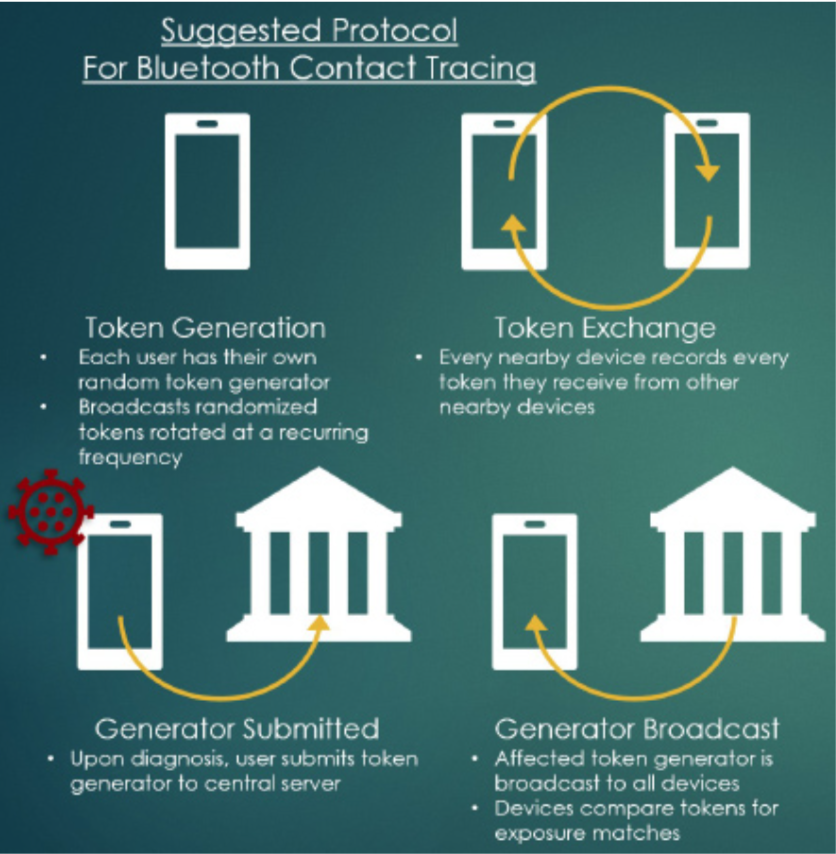Fantasies about a return to normalcy in the summer—picnickers in the park, baseball games, concerts, the ease after months of winter—are as delusional as Trump’s “aspirational” goal of crowded churches at Easter.
This is our reality: a vaccine must be “widely available” before we’re freed from secondary outbreaks—i.e., before we’re freed from strict physical-distancing measures. Scientists around the world are working at unprecedented speed, but we shouldn’t be tempted to turn Science into a god: a vaccine must be developed, tested, manufactured, distributed, and administered to millions before lockdowns are fully lifted. And that’s “unlikely [to happen] within the next two years.”
Two years—
Of this? No. It does not need to be this.

But if we’re going to have something different, we need to be smart, which means we need ‘smart testing’—the use of technology for contact tracing and selective quarantine. In other words, we’ll need to allow our movements and health status to be digitally monitored.
That statement raises alarm bells.
(As I write, I hear an ambulance in the distance.)
I’ll address the alarm bells in a moment; first, though, a few words about contact tracing.
First, a Few Words (the basics about tech-driven contact tracing)
In the absence of a vaccine or effective treatment, the only way to stop the disease from overwhelming the health-care system is to aggressively test, trace contacts, and selectively quarantine those who’ve been near an infected person.
Contact tracing is a common practice in public health, used throughout the world to contain outbreaks of disease. In the past, it’s been done manually, with public-health officials interviewing the person who’s sick, compiling a list of every person who’s been within the ‘virus shed distance,’ then contacting each of those people to initiate a quarantine and/or a test. This is a time-consuming and fallible process, reliant on a person’s memory to reconstruct where they’ve been for the incubation period of the disease which, for Covid-19, is 5-14 days.

The alternative is to use our cell phones to record where we’ve been and/or whom we’ve been close to; to share a positive test result with a central health authority or a decentralized platform; and to receive (or actively check for) a notification if we’ve come in contact with a person who’s positive. A notification would mean we’d need to quarantine or get a test which, if positive, would initiate the loop all over again: test, trace, and quarantine.
“viral spread is too fast to be contained by manual contact tracing, but could be controlled if this process was faster, more efficient and happened at scale. A contact-tracing App which builds a memory of proximity contacts and immediately notifies contacts of positive cases can achieve epidemic control if used by enough people.” —Luca Ferretti et al., Oxford University
Different apps and protocols are being devised, based on differing degrees of centralized control, user opt-in, means of communicating a match. In the West, this effort has been led by private companies and academia.
In Asia, by contrast, tech-driven contact tracing was delivered by the government: Singapore, South Korea, Taiwan, and China all had systems that were top-down and total. My guess is that the approach in North America will be more mixed, with people choosing which app to download, based on the uptake in their city or region. A comprehensive White Paper by a team at Harvard calls this a “hodgepodge approach.” This could work, but the uptake needs to be 60-80% in a given location in order for the system to be effective.
Will we get three-quarters of people in a democracy—especially one that’s adamant about civil liberties—to share their data? And should we?
Not according to several US senators, including Kamala Harris and Cory Booker, who warn that we shouldn’t force Americans to “trade their privacy at the expense of public health needs.”
But that argument gets it wrong—not just on a practical level, but also a philosophical one. And that’s not an academic point: if philosophy isn’t the magnetic pole that orients our actions, we’ll flail through this crisis, making decisions that shred the fabric of our society.
A Necessary Digression (which is really the core argument)
We can’t frame this question of technology as a debate of privacy vs. public health (i.e., security). This is about choosing between two different liberties: privacy vs. the freedom to pursue ‘happiness’—an unfortunate word that implies frivolity, but really means (to me, at least) the ability to define your self and your values without the interference of the state, or any authority, such as the church. By this definition, an extended period of quarantine would impinge on our ‘pursuit of happiness’ by denying us the right to work in a meaningful way, and to come into physical closeness with others.
Besides, most of us already cast aside our right to privacy for the sake of convenience and access. We live in a society where corporations—Google, Facebook, Fitbit, Amazon, etc.—know where I’ve been, who else was there, what I’ve bought, what I’ve read, the words I’ve searched, the words I’ve said, the rate of my heart, maybe even the rate of my heart when you’re in the room. And those corporations aren’t using the data to augment public health, they’re using it for private profit: target advertising rather than targeted quarantine.
So let’s not suddenly act on the principle when we’re facing a pandemic and the prospect of months of lockdown. Or, rather, let’s choose the principle we act on.
To my mind, the pertinent principle is fairness: we need to ensure that digital contact tracing doesn’t exacerbate inequalities that already exist in our society, leading to the spread of disease in subpopulations that are already vulnerable.
“It’s almost like we could’ve predicted that when a plague like this came along, it would disproportionately affect people who were already under a siege of economic violence anyway.” —Reverend Marshall Hatch
Rev. Hatch leads a congregation in Chicago, where 70% of Covid-related deaths are among Blacks; that community makes up 30% of the population.
So, while we’re thinking about principles, we should take note that the opportunity to pursue happiness must be more equitable in a post-Covid world. My rights, I’ve said, would be limited by extended lockdown. I’m aware, though, that many essential workers don’t have the luxury of lockdown: low-paid and under-protected, they’re working non-stop to pick our food, cook our food, pack our groceries. In other words, I’m aware of the limitations of philosophy (and this essay), even as I use them to orient me through this strange terrain.
Bringing the Essay Home (though it never left)
So what happens next? I’d surmise that we should all be on-the-lookout for discussions about different apps, because tech-driven contact tracing will be indispensible if physical-distancing measures—and the concomitant economic devastation—are going to be eased prior to widespread vaccine availability. Think about which system works for you: do you want to be alerted automatically, or would you prefer to actively check whether you’ve come in contact with a test-positive person? Do you feel comfortable reporting to a centralized database, or would you only opt into a system that sidesteps a central authority?

Of course, the government might not allow us to choose which app we use, which means we’ll have a whole new set of questions to consider. Regardless of that, though, there’s the question of consequence: namely, does a system of monitoring imply a system of punishment for non-compliance?
I’ll consider those questions in my next essay.
April 11, 2020